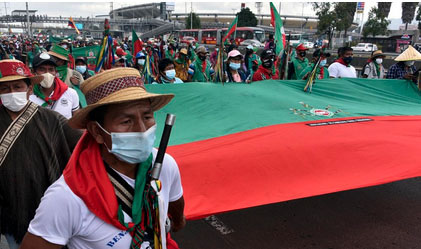More than 3,000 indigenous people from the Colombian department of Cauca are marching in Bogotá in search of direct dialogue with President Gustavo Petro. The communities plan to remain in the capital, and assure that more people will arrive until an agreement is reached that satisfies their demands in the face of the humanitarian crisis that the territory is suffering due to armed violence. Our colleague Andrés Fernández Sánchez gives us more details from the field
by the El Reportero‘s wire services
August 27, 2024 – It was the first mobilization in the streets of Bogotá since they arrived a week ago from the department of Cauca, after traveling more than 500 kilometers by bus, to camp in a park in the city center waiting to reach political agreements with the high government.
“Today (the indigenous movement) shows the country that it is not subjugated to any government, that we support this government, yes, but that we have the character and the capacity for self-criticism to say what is not working well,” Jhoe Sauca, senior counselor of the Cauca Regional Indigenous Council (CRIC), the highest authority of the community in the region, told The Associated Press.
“The robbery of the century”: Petro reacts after multimillion-dollar corruption scandal in Colombia
More than 2,000 projects to benefit the most vulnerable communities were not completed or their contracts expired, without the works being carried out
The president of Colombia, Gustavo Petro, described as “the robbery of the century” the report of a multimillion-dollar sum of resources that were assigned to public works that present irregularities both in the time of execution and in the expiration of the contracts.
“There are 12 billion lost in the royalty system. The robbery of the century. Works that appear to be done and when they are visited they never started,” wrote the head of state.
The Colombian president commented on the statements made by the director of the National Planning Department (DNP), Alexander López Maya, who asked for a swift investigation of the 2,094 projects that “did not comply with contractual obligations,” that is, those that belong to suspended or expired contracts, and whose investment had been 12 billion pesos (2.9 million dollars). “These resources are practically lost,” he added.
This millionaire sum was allocated to projects, through the General System of Royalties (SGR), a coordination scheme between territorial entities and the Government to manage and execute the income from the exploitation of non-renewable natural resources.
“Twelve billion that should have built peace”
According to the head of Planning, of those 2,094 resources that did not comply with their contractual obligations, 1,497 have an expired execution period that amounts to nine billion pesos (2.2 million dollars); 301 have all contracts suspended for a value of one billion pesos (248,000 dollars) and 296 have all contracts suspended and have expired execution deadlines for a value of two billion pesos (496,000 dollars).
“Twelve billion pesos that should have been used to resolve the problems of drinking water, basic sanitation, building schools, health centers, roads to connect the territories. Resources that should have been used to build peace.”
López Maya illustrated that with 12 billion pesos, the access to water for all the people of La Guajira, who have had a historical lack of access to the resource and drought, could be solved in a “definitive” way; a sewerage and aqueduct system for the city of Quibdó, capital of the department of Chocó, one of the poorest in Colombia; or the supply of drinking water for the region of Urabá.



